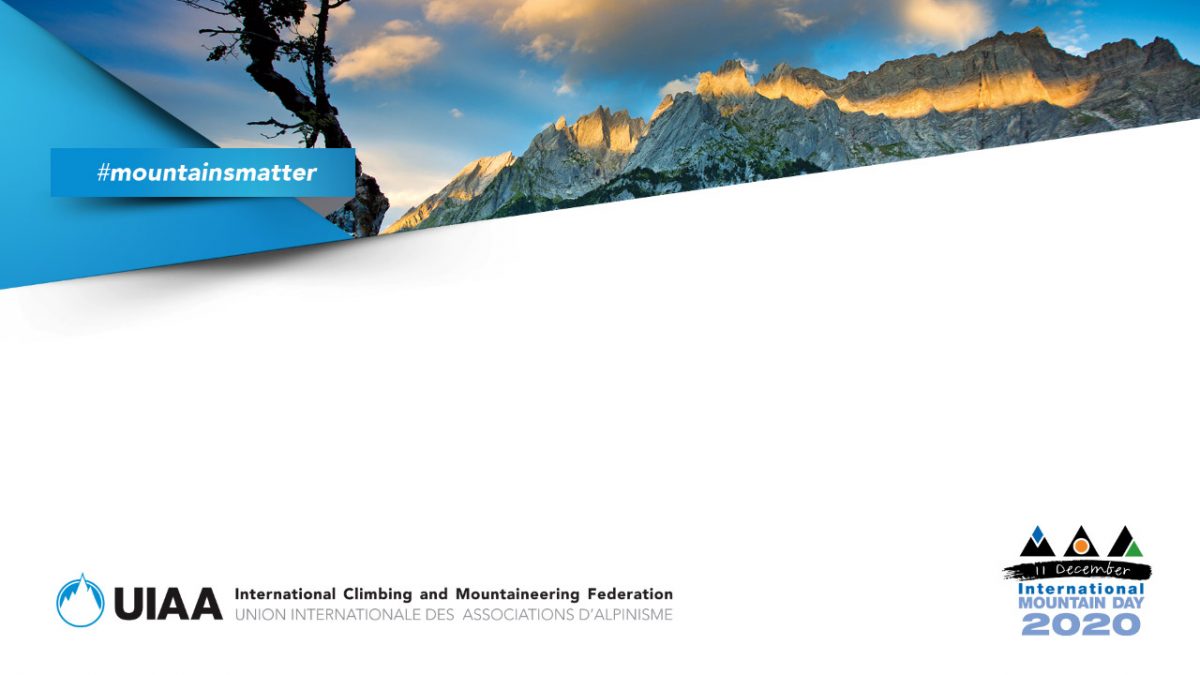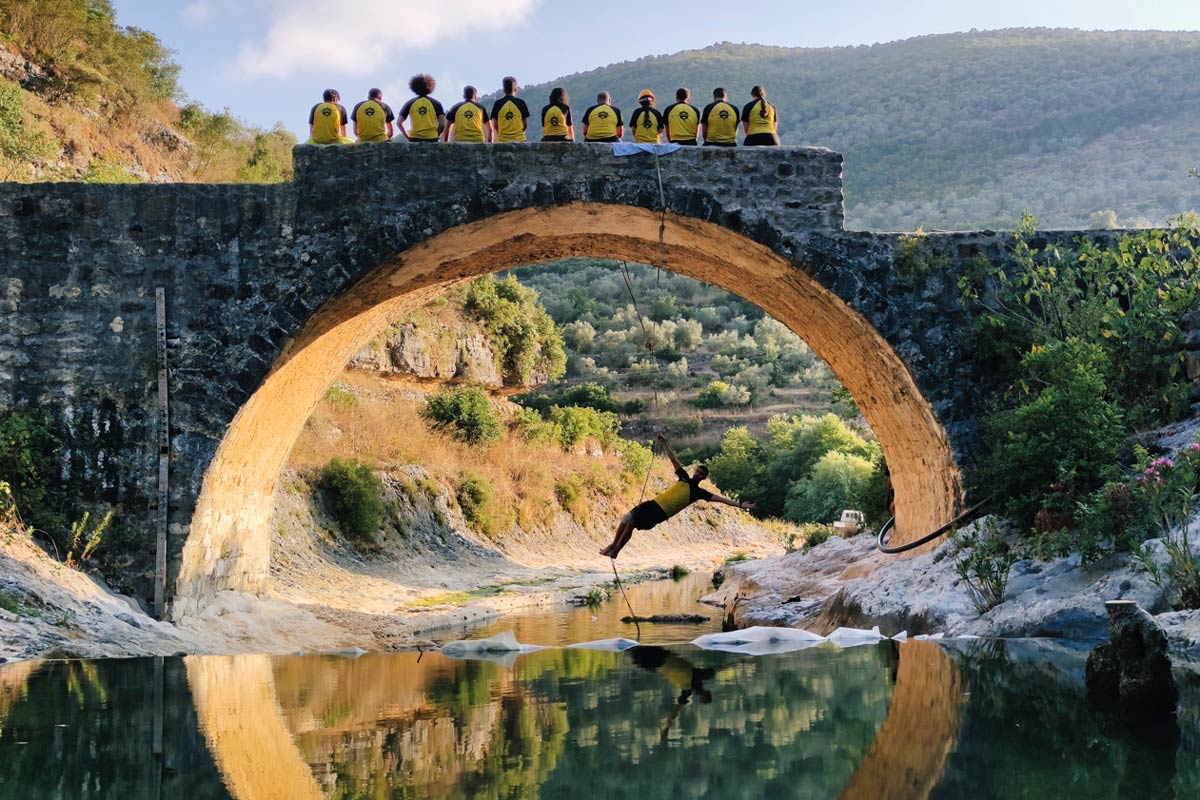Ahead of this year’s United Nations’ International Mountain Day (IMD) – 11 December – the UIAA is promoting a series of initiatives. These include those led by the United Nations Environment Programme (UNEP), UIAA member associations, Mountain Partnership, the Mountain Research Initiative (MRI) as as well as those organised by the UIAA itself (further details, as of 3 December, here).
As of 2003, IMD has been observed every year to create awareness about the importance of mountains to life, to highlight the opportunities and constraints in mountain development and to build alliances that will bring positive change to mountain peoples and environments around the world.
Below are details regarding the specific 2020 Theme (published by the United Nations) as well as information on initiatives the UIAA community is organising around 11 December. Social posts will be shared with the hashtag #mountainsmatter

2020 Theme: Mountain biodiversity
Mountain biodiversity is the theme of this year’s IMD. Mountains loom large in some of the world’s most spectacular landscapes. Their unique topography, compressed climatic zones and isolation have created the conditions for a wide spectrum of life forms.
Biodiversity encompasses the variety of ecosystems, species and genetic resources, and mountains have many endemic varieties. The differentiated topography in terms of altitude, slope and exposure in mountains offers opportunities to grow a variety of high-value crops, horticulture, livestock and forest species.
For example, mountain pastoralists in Pakistan have a highly treasured livestock genetic resource pool with special traits bred into animals, such as disease resilience, which can help adaption to changing climate. Nearly 70% of mountain land is used for grazing and provides manure that enhances soil fertility. Livestock not only produces food items such as milk, butter and meat, but also valuable by-products, such as some of the most precious yarns, like cashmere wool.
However, climate change, unsustainable farming practices, commercial mining, logging, and poaching all exact a heavy toll on mountain biodiversity. In addition, land use and land cover change, and natural disasters, accelerate biodiversity loss and contribute to creating a fragile environment for mountain communities. Ecosystem degradation, loss of livelihoods and migration in mountains can lead to the abandonment of cultural practices and ancient traditions that have sustained biodiversity for generations.
The sustainable management of mountain biodiversity has been increasingly recognized as a global priority. Sustainable Development Goal 15, target four, is dedicated to the conservation of mountains’ biodiversity in consideration of its global relevance. Biodiversity in all ecosystems is in focus, as the United Nations has declared 2021 to 2030 the UN Decade on Ecosystem Restoration and governments prepare to negotiate the post-2020 global biodiversity framework for adoption this year at the 15th meeting of the Conference of the Parties (COP 15) to the Convention on Biological Diversity (CBD).
UIAA on 11 December
The UIAA’s flagship sustainability programme is its annual Mountain Protection Award (MPA). Following the decision by the UIAA Mountain Protection Commission (MPC), owing to Covid-19, to postpone the 2020 Award to 2021, the UIAA has focused on profiling the progress made by past recipients of the Award. What impact has the Award had on a project fulfilling its goals? How have projects which require on the ground field work managed to evolve during Covid-19? What makes a successful project? How have projects worked with governments and other authorities to further their ambitions?

Recent profiles include the Swiss Alpine Club’s Alpine Learning Project Weeks, the Mount Everest Biogas Project and Mountain Wilderness France‘s scheme to remove obsolete facilities from the Alps. For IMD, the UIAA will focus not only on past winners but a number of nominated projects, with a dedicated focus on mountain biodiversity. A significant focus of the Award, partnered by Bally since 2020, is to support all nominated projects through their lifecycle. For IMD, project leaders will assess the impact of climate change on biodiversity and challenges faced during Covid-19. A dedicated article will be available on 4 December and posts shared across the UIAA’s social media channels.
Although the 2020 MPA has been postponed until 2021, the application process for projects is open.
Climate change is another key focus of the UIAA and was debated in detail at the federation’s recent General Assembly. Ahead of IMD, the UIAA will publish its Carbon Footprint Report for 2019, comparing progress with its inaugural report for 2018.
The UIAA is also working with UNEP, Mountain Partnership and the Mountain Research Initiative (MRI) in the promotion of global biodiversity stories and assets.
UIAA Member Associations
UIAA member associations are encouraged to provide details of their own programmes organised for IMD to carol.kahoun@theuiaa.org. The UIAA will share initiatives as part of the #mountainsmatter movement around 11 December.
United Nations Environment Programme – Online IMD Event
On 11 December itself, UNEP will host a live Mountains High Virtual Event ‘Adventure for Climate Action’ from 15.30-16.45 CEST. Dr Carolina Adler, President of the UIAA MPC, will be among the panellists.
Mountain Partnership Events
Mountain Partnership will host its own virtual event on 11 December. The main aim of this event is to promote dialogue and cooperation on solutions for halting the loss of mountain biodiversity, protecting mountain ecosystems and improving food security and livelihoods in mountains. MP also wishes to highlight the work that many Mountain Partnership members are doing around the world, including youth and indigenous communities, to ensure that mountain communities are not left behind in the spirit of the UN 2030 Agenda. The UIAA will be represented during the round table discussions by its new President Peter Muir. The session (scheduled for 14.30–16.15 CET) will be shared on the UIAA’s social media channels. The agenda for the event, and viewing details, can be consulted here.

In the lead up to IMD (see above video), Mountain Partnership hosted an online panel featuring seven youth mountain champions from around the world addressed sustainable mountain development and biodiversity conservation during a web dialogue organised by the Mountain Partnership Secretariat. Each coming from different sectors and backgrounds, the panelists shared their unique experiences and innovative solutions to kick off action and discussion in the lead up to IMD 2020.
Mountain Research Initiative (MRI)
A partner of the UIAA, Bern-based Mountain Research Initiative (MRI), will mark IMD by sharing key messages and extracts from the Intergovernmental Panel on Climate Change (IPCC) Special Report on the Ocean and Cryosphere in a Changing Climate (SROCC). The MRI contributed closely to the report. It compiles the findings of thousands of scientific studies, painting a stark picture of the impacts, outlook, and potential for adaptation to unparalleled and enduring changes in the ocean and cryosphere as a result of global warming – and highlighting the urgency of timely, ambitious, and coordinated action on greenhouse gas emissions. The MRI will publish further details related to its IMD activities on its website later this week.
To get in touch with the UIAA about IMD please contact Carol Kahoun.
To discover more about the UIAA’s work in sustainability please click here.
Main photo:




